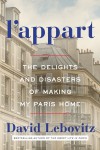19
Followers
19
Following
M Sarki
Besides being a poet with four collections published, M Sarki is a painter, film maker, and photographer. He likes fine coffee and long walks.
M Sarki has written, directed, and produced six short films titled Gnoman's Bois de Rose, Biscuits and Striola , The Tools of Migrant Hunters, My Father's Kitchen, GL, and Cropped Out 2010. More details to follow. Also the author of the feature film screenplay, Alphonso Bow.
Currently reading
L'Appart: The Delights and Disasters of Making My Paris Home
We Learn Nothing: Essays
Elmet: LONGLISTED FOR THE MAN BOOKER PRIZE 2017
Limbo, and Other Places I Have Lived: Short Stories
The Double Life of Liliane
At Home with the Armadillo
American Witness: The Art and Life of Robert Frank
Autumn
Inside Out: A Personal History of Pink Floyd (Reading Edition)
American Witness: The Art and Life of Robert Frank
Everything Passes
 http://msarki.tumblr.com/post/77639260665/everything-passes-by-gabriel-josipovici
http://msarki.tumblr.com/post/77639260665/everything-passes-by-gabriel-josipoviciIf I hadn't discovered the writer [a:Ágota Kristof|134770|Ágota Kristof|https://d202m5krfqbpi5.cloudfront.net/authors/1389532281p2/134770.jpg] I would never have heard of this man. Gabriel Josipovici wrote an introduction to her short memoir titled [b:The Illiterate|19707301|The Illiterate|Ágota Kristof|https://d202m5krfqbpi5.cloudfront.net/books/1392000681s/19707301.jpg|1231619] and I was so impressed with his comments and his style that I thought he would be a good enough writer to take a chance on reading. It is astonishing to me the number of books Gabriel Josipovici has published, not to mention the many different genres he has been involved with including both long and short fiction, plays, essays, and literary criticism. It is even more astounding to me that he is not better read and known of more widely. I believe his personal focus has been zeroed in on his own writing rather than the marketing of his good name. I respect him for this and count him as a model of professional behavior for all serious artists no matter their choice of media and expression.
On first read this slender volume of sixty pages is at once recognized as being among the highest quality of literature. Poetic, dramatic, and certainly lyrical. It is written in a manner that even seems important. Moments of dagger-like clarity bristle within a sparseness almost Beckettian in form if not also in its ambiguities. But there is something about the narrative that reminded me also of the very best of Paul Auster. Nothing in the entire oeuvre of Paul Auster even comes close to this book except for one example titled [b:Travels in the Scriptorium|454|Travels in the Scriptorium |Paul Auster|https://d202m5krfqbpi5.cloudfront.net/books/1386923599s/454.jpg|2364730] which was brilliant in its execution. Much of the same foreboding tone can be found in both of these works, but in total, Everything Passes is the far superior work.
I believe that serious readers somehow find their way into understanding a worthy text. Others of us need rather to be taught how to read and devour difficult, and perhaps ambiguous, material. My position as stated for reading literature is no different than it was during my long career regarding the use and appreciation of building materials. If the product looks good from a distance it should look even better the closer one gets face to face to it. Even a repeated and focused gaze should provide the observer with an even more aesthetic value attached to the object. If it does not, then do not buy it. Most materials do not pass this extreme test and it is a sorry fact that few people do the exercises necessary to even get to this understanding of aesthetic value in art of any kind.
On my second read, less than a day later, I indeed found the book to be richer and better understood than the first time. Names seemed to matter more to me and the characters emerged from the text with more meaning for me. I actually began to distinguish between the voices speaking. Most everything that was previously unclear to me became illuminated and the ambiguity lessened in large degrees the closer I examined the text. This type of literature is easily discounted for its brevity and lack of convention. I understand this phenomenon in a most personal way. This brevity and ambiguity is the basis of my own early work found especially in my first book titled [b:Zimble Zamble Zumble|1966801|Zimble Zamble Zumble|M. Sarki|https://d202m5krfqbpi5.cloudfront.net/books/1347445248s/1966801.jpg|1969960]. I would bet that anyone who spends an adequate amount of time with this poetry would come away carrying an attractive bundle of feeling for the text and an understanding based on what you brought of yourself to the page. It has been mentioned to me in the past by my editor that I did create entire worlds within the confines of these short poems, and for that reason he always wondered why I would ever want to change to writing a longer form of prose when I could already succeed with so much less. Needless to say, I am tooting my own horn here. But my early work is a perfect example in light of discussing the book, Everything Passes. After reading this novel multiple times now I find I am the better for it. The aesthetic value of this work will ultimately be judged by history, but it specifically needs, and has to start, with readers like me.







